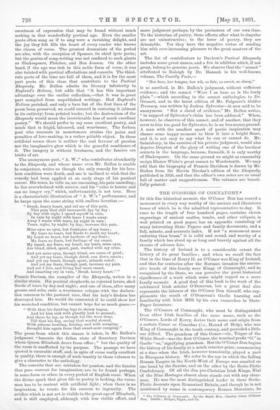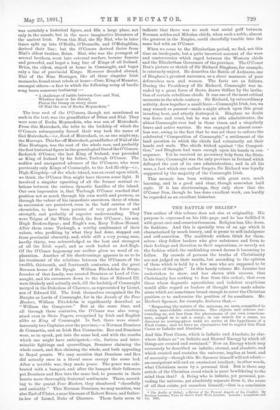THE O'CONORS OF CONNAUGHT.* IN this fine historical memoir, the
O'Conor Dori has reared a monument in every way worthy of the ancient and illustrious house of which he is the admitted representative to-day. It runs to the length of four hundred pages, contains eleven engravings of ancient castles, tombs, and other religuile, is well printed on good paper, has an appendix consisting of many interesting State Papers and family documents, and a full, minute, and accurate index. If not "a monument more enduring than brass," it is solid and sound, and worthy of a family which has stood up so long and bravely against all the storms of adverse fate.
The history of Ireland is to a considerable extent the history of its great families ; and when we recall the fact that in the time of Henry II. an O'Conor was King of Ireland, and that for centuries after the Norman invasion the succes- sive heads of this family were Kings of Connaught, and so recognised by the State, we can perceive the great historical significance of a work which some might regard as a mere family memoir. A good deal of this book is the work of the celebrated Irish scholar O'Donovan, but a great deal also represents the labours of the O'Conor Don himself, who sup- plements the result of O'Donovan's Gaelic learning and familiarity with Irish MSS. by his own researches in State- Paper literature.
The O'Conors of Connaught, who must be distinguished from other Irish families of the same name, such as the O'Oonors, Lords of Kerry, derive their name and origin from a certain Conor or Ooncobar (i.e., Hound of Help), who was King of Connaught in the tenth century, and preceded alittle our Alfred. The grandson of this Conor—viz., Teigue of the White Steed—was the first O'Conor, the nominal prefix "0," in Gaelic " na," signifying grandson. But the O'Conor Don begins the history of his family at a much remoter point, commencing at a time when the Irish, however transiently, played a part in Bbropea.n history. We refer to the age in which the failing Roman Empire in the North-West of Europe was assailed on one hand by the Saxons, and on the other by the Scoto.Pictic Confederacy. Of all the dim pre-Christian Irish Kings, Nial of the Nine Hostages almost alone stands out with any clear- ness. He was the most distinguished leader in these Scoto- Pictic descents upon Romanised Britain, and though he is not mentioned by name in contemporary Roman literature, he * The O'Cenore of Connaught. By the Right Floe. Charles Owon O'Cloaor Den. Dublin Hodges, Figgie, and CO. was certainly a historical figure, and fills a large place, not only in the annals, but in the more imaginative literature of the ancient Irish. From this Nial, the Hy Nial, who in later times split up into O'Neills, O'Donnells, and O'Melaghlins, derived their line ; but the O'Conors derived theirs from Nial's eldest brother, Brian. Nial, who was the youngest of several brothers, went into external warfare, became famous and powerful, and begot a long line of Kings of all Ireland.
Brian, the eldest, stayed at home in Connaught, and begot only a line of provincial Kings. However dreaded abroad, Nial of the Nine Hostages, like all these singular Irish monarchs, found stout rebels at home—Coro, King of Munster, amongst others—a fact to which the following scrap of bardic song bears sonorous testimony :— " A challenge of battle between Core and Nial,
Whether near or far distant, Fierce the tramp on every shore Of Nial the son of Eocha Moymodoin."
The true root of the O'Conors, though not mentioned as such in the text, was the grandfather of Brian and Nial. They were sons of Eocba Moymodoin, who was son of Muiredach. From this Muiredach, the tribe to the lordship of which the O'Conors subsequently forced their way took the name of Siol Muiredach,—i,e., Seed of Muiredach, or, as one might say, the Murrays. This far-off Muiredach, grandfather of Nial of the Nine Hostages, was the root of the whole race, and probably the first historical figure in the genealogical line of the O'Conors. Roderick O'Conor, the last King of Ireland, was preceded as King of Ireland by his father, Turlough O'Conor. The sudden and unexpected advance of the O'Conors, who were previously only Kings of Connaught, to the Ard-Ri-ship—i.e., High-Kingship—of the whole island, was aft event upon which, we think, the O'Conor Don might have thrown some light. It involved a singular upsetting of all the former mutual re- lations between the various dynastic families of the island. Our own impression is, that Turlough O'Conor reached that position not so much through his own worth and prowess, as through the valour of his immediate ancestors, three of whom in succession are perceived, even in the bald entries of the chronicles, to have been persons of very great force and strength, and probably of superior understanding. They were Teigue of the White Steed, the first O'Conor ; his son, Hugh Broken-Spear; and Hugh's son, Rory Yellow-Hound.
After them came Turlough, a worthy continuator of their valour, who, profiting by what they had done, stepped out from provincial obscurity, and, while still a very young man, hardly thirty, was acknowledged as the best and strongest of all the Irish reguli, and as such hailed as Ard-Righ. Of the O'Conor hegemony our author gives no word of ex- planation. Another of his shortcomings appears to us to be his treatment of the relations between the O'Conors of the twelfth, thirteenth, and fourteenth centuries, and the great Norman house of De Burgh. William FitzA.delm de Burgo, founder of that family, was created Dominus or Lord of Con- naught, and his successors down to the time of Edward were titularly and actually such, till the lordship of Connaught merged in the Dukedom of Clarence, as represented by Lionel, eon of Edward III. The Irish themselves recognised the De Burghs as Lords of Connaught, for in the Annals of the Four Masters, William Fit zAdelm is significantly described as "William the Conqueror." But at the same time, and all through these centuries, the O'Conor was also recog- nised even in State Papers, recognised by Irish and English alike as King of Connaught. In fact, there were simul- taneously two Captains over the province,—a Norman Dominus de Connactia, and an Irish Rex Connactiw. Rex and Dominus were, so to speak, put into the same bed, and with the results which one might have anticipated,—viz., furious and inter- minable fightiugs and quarrellings, Dominus claiming the whole couch, and Rex claiming the whole, and both appealing to Royal grants. We may mention that Dominus and Rex did actually once in a literal sense occupy the same bed. After a terrible war, they made peace. The peace was cele- brated with a banquet, and after the banquet their followers put Dominus and Rex into the same bed, to promote in their hearts more thoroughly fraternal sentiments. There, accord- ing to the quaint Four Masters, they slumbered "cheerfully and amicably." This Norman Dominus, we may mention, was also Earl of Ulster, a near kinsman of Robert Bruce, and father- in-law of Lionel, Duke of Clarence. These facts seem to indicate that there was no such vast social gulf between Norman nobles and Milesian chiefs, when such a noble, almost the greatest in the Empire, could cheerfully tumble into the same bed with an O'Conor.
When we come to the Elizabethan period, we find, not this time an inadequate, but a quite incorrect account of the wars and controversies which raged between the Western chiefs and the Elizabethan Governors of the province. The O'Conor Don's picture or sketch of Sir Richard Bingham, for example, is extremely unjust. He describes the Battle of Ardnaree, one of Bingham's greatest successes, as a sheer massacre of poor defenceless men and women. The facts are as follows.
During the Presidency of Sir Richard, Connaught was in- vaded by a great foroe of Scots, drawn thither by the invita- tion of certain rebellious chiefs. It was one of the most critical moments in the whole century. Sir Richard, by extraordinary activity, drew together a small force—Connaught Irish, too, we may remark en passant—made a night attack upon this great invading host, and utterly destroyed it. Bingham no doubt was fierce and cruel, but he was an able administrator, the ablest Connaught ever had in those times, and a singularly brave and active warrior. He was engaged in almost cease- less war, owing to the fact that he was set there to enforce the celebrated " Composition of Connaught," a settlement of the land question to which the chiefs had voluntarily set their hands and seals. The chiefs kicked against "the Composi- tion," and Bingham bad wars enough upon his hands in con- • sequence. Yet he received no pecuniary help from the State. In his time, Connaught was the only province in Ireland which defrayed the cost of its own administration; and in all his wars, a fact which our author forgets, Sir Richard was loyally supported by the majority of the Connaught Irish.
This memoir has been written with great care, much learning, and in a good and clear, though somewhat bald style. If it has shortcomings, they only show that the O'Conor Don, though he has done excellent work, can hardly be regarded as an excellent historian.



































 Previous page
Previous page